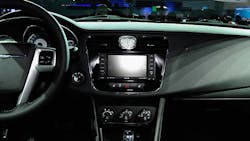A little-known Chinese company has seized on the unprecedented global airbag crisis surrounding Japan’s Takata Corp., buying a small American manufacturer in a bet that a shakeup of an oligarchic industry is under way.
Founded in 2004 by entrepreneur Wang Jianfeng, Ningbo Joyson Electronic Corp. has grown into one of China’s largest suppliers of automotive components, counting General Motors Co. and Volkswagen AG among its major customers. The company bought U.S.-based airbag supplier Key Safety Systems for $920 million in cash from private-equity firms in February, three months after U.S. regulators fined Takata and ordered it to phase out air bag inflator propellant linked to as many as 11 deaths.
Sweden’s Autoliv Inc., Japan’s Daicel Corp., Germany’s ZF Friedrichshafen AG and Key Safety are among companies that have ramped up production to supply automakers that need to replace at least 66 million Takata inflators and equip future models with air bags that safety regulators are more confident in. Takata, meanwhile, could face billions of dollars in potential compensation to cover carmakers’ recall costs and has hired outside advisers to draft a restructuring plan.
“It’s very difficult for Takata to recover from this, and the company may be facing a bankruptcy crisis,” Joyson CEO Tang Yuxin said in a phone interview. “All of this has given us a heaven-sent opportunity to enter the industry. What was a market split among four is now shared among three players, so the opportunities naturally have increased a lot.”
Takata fell as much as 9.4% and was down 6.9% Tuesday afternoon in Tokyo trading, the steepest decline in the 66-member TOPIX transportation index. Ningbo Joyson shares have been suspended from trading since November.
The global market for driver-assistance features such as collision warning and emergency auto braking in cars is projected to double to $17 billion in annual revenue by 2021, according to researcher IHS Automotive. Within the broader auto-safety components market, air bags are dominated by the trio of Takata, Autoliv and ZF’s TRW. Despite being home to the world’s largest market for vehicle sales, China has yet to produce a globally competitive automaker or parts supplier.
Joyson has ambitions to change this. By integrating its existing drive-control systems with Key Safety’s safety technology, Joyson aims to minimize injuries and deaths by detecting possible collisions and automatically triggering brakes and deploying airbags, Tang said. Key Safety, which was already ramping up inflator capacity two years earlier than scheduled before Joyson’s acquisition, probably will boost revenue this year by 25% to more than $2.5 billion, half of which will come from the airbag business, according to Tang.
In the longer term, Joyson plans to develop safety technology for autonomous driving and challenge global leaders such as Continental AG, Robert Bosch GmbH and Denso Corp., Tang said. Along with announcing the acquisition of Key Safety, Joyson bought the automotive division of Germany’s TechniSat Digital GmbH for 180 million euros ($198.76 million) to develop car connectivity, infotainment and navigation systems. Combining the two acquisitions will boost Joyson’s sales to 20 billion yuan ($3.08 billion) this year, and the company may reach 30 billion yuan ($4.61 billion) in three years, Tang said.
The takeovers highlight how Chinese car-parts suppliers are positioning for the introduction of self-driving and connected cars. By 2035, as many as 12 million autonomous vehicles might be sold globally, about 10% of total light vehicle sales, according to IHS Automotive’s estimates.
“The level of R&D development in China is obviously starting for those technologies, but most of the heavy lifting is happening elsewhere,” said Matteo Fini, an auto-components analyst for IHS. China’s government wants companies “to become stronger and stronger in some of these upcoming technologies” and boost industrial competitiveness, he said.
While Joyson will focus on integration with Key Safety and TechniSat during the next two years, Tang won’t rule out the possibility of adding more companies to the portfolio. The company isn’t considering any deal involving Takata, due to lingering risks, he said.
“Technologically, I don’t think we are inferior to global leaders,” Tang said. “There’s a long way to go but we aim to establish ourselves among the top three suppliers in these areas.”
By Ma Jie
About the Author
Bloomberg
Licensed content from Bloomberg, copyright 2016.
